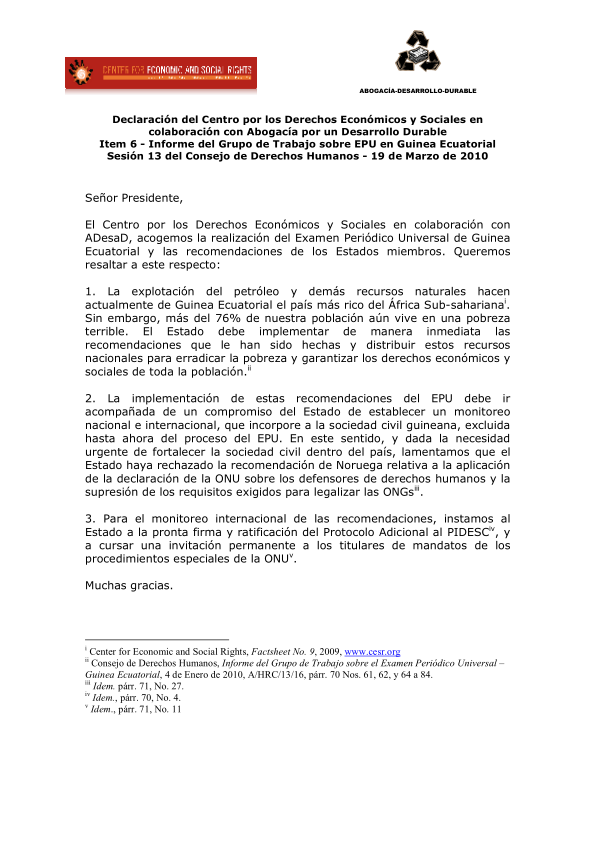We just got back from Geneva, where on Friday the government of Equatorial Guinea faced the UN's Human Rights Council. They were there to report on the country's human rights record.
The Vice-Prime Minister in charge of the Social and Human Rights Sector, H.E. Mr. Salomon Nguema Owono, appeared before the 13th session of the Human Rights Council to explain just how the country will meet the council's recommendations to improve the country's human rights record. Those recommendations were made public in the Report of the Working Group in January. CESR had contributed to the process that led to the UN recommendations with research and recommendations of our own.
During its presentation, government representatives emphasized that during the Council's "Universal Periodic Review" (UPR) process "there was an unequivocal commitment by the government with respect with the ideas and values of the promotion and protection of human rights which are part and parcel of human dignity of nationals of our country."
The government assured members of the Human Rights Council that it will renew its readiness to continue working with technical assistance and cooperation of the UN Office of the High Commission for Human Rights "in breaking down the legal, institutional, political, economic, social and cultural obstacles which today continues to prevent or limit the full enjoyment in Equatorial Guinea of the human rights recognize for persons."
For a full video presentation of the Government's response to the Council, visit the UN Webcast site
In relation to the UPR recommendations on how to improve its human rights record, the government highlighted that they fully agreed and accepted 86 of the recommendations and discussed some of the measures they are already taking to implement these recommendations. For example:
- Beginning to trigger legal procedures for the possible incorporation of certain international treaties into national legislation, such as the optional protocol to the ICESCR
- Implementing a law against torture (which it emphasized is a political priority for the government)
- A package of measures related to discrimination against women
- The approval of a new criminal code.
The government was very clear, however, that there were some "recommendations we cannot accept." In particular they referred to three:
- Ratification of the statute of the international criminal court
- Ratification of the optional protocol of the covenant relating to the abolition to death sentence
- Granting access to military installations for the UN's Special Rapporteur on Torture.
The government argued that it could not support these recommendations because of "serious difficulties which we say are of the legal order and are related to social conscious as well."
CESR made a joint statement with Abogacía por un Desarrollo Sustentable (ADesaD) about how Equatorial Guinea, one of the richest countries per capita in sub-Saharan Africa, has a duty to fulfil its human rights obligations, including economic and social rights.
Further, we argued that monitoring mechanisms for the implementations of the UPR recommendations must be put in place to hold the government accountable of its commitment to human rights under the UPR process. CESR and ADesaD also coordinated with other organizations including Human Rights Watch, Open Society Justice Initiative and EG Justice to deliver oral statements during the Human Rights Council session that emphasized the lack of respect and protection of human rights in the country. We highlighted the lack of participation for national civil society in general and during the UPR process.
During the HRC session in Geneva, CESR together with EG Justice and Open Society Justice Initiative, also organized a side event: "Human Rights in Equatorial Guinea: taking actions on the UPR recommendations." The event featured a series of panelists from inside Equatorial Guinea to debate possible follow-up options to ensure the implementation of the UPR recommendations.
